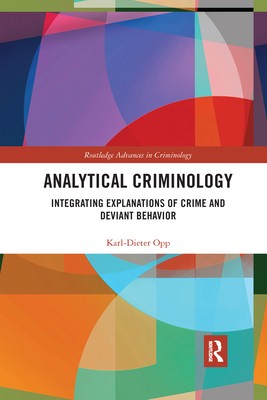
- We will send in 10–14 business days.
- Author: Karl-Dieter Opp
- Publisher: Routledge
- ISBN-10: 1032336420
- ISBN-13: 9781032336428
- Format: 15.5 x 23.4 x 1.8 cm, softcover
- Language: English
- SAVE -10% with code: EXTRA
Reviews
Description
There are more than 20 theories that explain crime. Each theory has weaknesses, and no scholar knows which theory is best. To remedy this unsatisfactory situation a new research program of comparative theory testing is proposed. Comparing the theories with each other has not yet been successful. The alternative, suggested in this book, is to show how criminological theories must be modified if they are compared with a general behavioral theory. The book shows under which conditions the major criminological theories provide valid explanations of crime. The latter thus become integrated as parts of the general theory.
The general theory that is chosen is a version of the theory of rational action. This is not the problematic version discussed in the literature, but states the real conditions of decision making and, thus, explains when people actually violate the law or remain law-abiding.
The general theory is a component of a theoretical approach that explains individual behavior in interaction with societal (macro) conditions. This micro-macro approach is summarized in a proposed structural-cognitive model. This is part of the new program of Analytical Criminology. It suggests empirical theory comparison, process explanations, and micro-macro explanations.
The book is not only written for readers who are interested in theories of crime and deviant behavior. It is also a treatise in "analytical" (i.e., rigorous) theory construction and empirical theory comparison.
EXTRA 10 % discount with code: EXTRA
The promotion ends in 19d.13:27:44
The discount code is valid when purchasing from 10 €. Discounts do not stack.
- Author: Karl-Dieter Opp
- Publisher: Routledge
- ISBN-10: 1032336420
- ISBN-13: 9781032336428
- Format: 15.5 x 23.4 x 1.8 cm, softcover
- Language: English English
There are more than 20 theories that explain crime. Each theory has weaknesses, and no scholar knows which theory is best. To remedy this unsatisfactory situation a new research program of comparative theory testing is proposed. Comparing the theories with each other has not yet been successful. The alternative, suggested in this book, is to show how criminological theories must be modified if they are compared with a general behavioral theory. The book shows under which conditions the major criminological theories provide valid explanations of crime. The latter thus become integrated as parts of the general theory.
The general theory that is chosen is a version of the theory of rational action. This is not the problematic version discussed in the literature, but states the real conditions of decision making and, thus, explains when people actually violate the law or remain law-abiding.
The general theory is a component of a theoretical approach that explains individual behavior in interaction with societal (macro) conditions. This micro-macro approach is summarized in a proposed structural-cognitive model. This is part of the new program of Analytical Criminology. It suggests empirical theory comparison, process explanations, and micro-macro explanations.
The book is not only written for readers who are interested in theories of crime and deviant behavior. It is also a treatise in "analytical" (i.e., rigorous) theory construction and empirical theory comparison.


Reviews